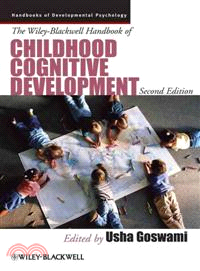Wiley-Blackwell Handbook Of Childhood Cognitive Development 2E
商品資訊
ISBN13:9781405191166
出版社:John Wiley & Sons Inc
作者:Goswami
出版日:2010/08/20
裝訂/頁數:精裝/816頁
定價
:NT$ 13198 元優惠價
:90 折 11878 元
若需訂購本書,請電洽客服 02-25006600[分機130、131]。
商品簡介
作者簡介
名人/編輯推薦
目次
相關商品
商品簡介
This definitive volume is the result of collaboration by top scholars in the field of children's cognition.
New edition offers an up-to-date overview of all the major areas of importance in the field, and includes new data from cognitive neuroscience and new chapters on social cognitive development and language
Provides state-of-the-art summaries of current research by international specialists in different areas of cognitive development
Spans aspects of cognitive development from infancy to the onset of adolescence
Includes chapters on symbolic reasoning, pretend play, spatial development, abnormal cognitive development and current theoretical perspectives
New edition offers an up-to-date overview of all the major areas of importance in the field, and includes new data from cognitive neuroscience and new chapters on social cognitive development and language
Provides state-of-the-art summaries of current research by international specialists in different areas of cognitive development
Spans aspects of cognitive development from infancy to the onset of adolescence
Includes chapters on symbolic reasoning, pretend play, spatial development, abnormal cognitive development and current theoretical perspectives
作者簡介
Usha Goswami is Professor of Education at the University of Cambridge and a Fellow of St John's College, Cambridge. She is also Director of the Centre for Neuroscience in Education, which carries out research into the brain basis of literacy, numeracy, dyslexia, and dyscalculia. Dr Goswami has received numerous awards for her work, including the British Psychology Society Spearman Medal, the Norman Geschwind-Rodin Prize for Dyslexia research, and fellowships from the Leverhulme Trust in the United Kingdom, the National Academy of Education in the United States, and the Alexander von Humboldt Foundation in Germany.
名人/編輯推薦
"Overall, the handbook is a thoughtful and valuable reference work, to which users can refer for an impressive range of research." (Julia Carroll, Journal of Child Psychology and Psychiatry, 44:6)
"Though the structure of this book is similar to other volumes in the series, I welcome it with even greater enthusiasm than the rest. While they all summarise and review the latest scientific research in their particular area of child development, research in the field of infant cognition has, in the last few years, completely overturned all previous conceptions. This volume, therefore, not only summarises and updates the literature in its field, but also replaces much of it ... at the moment this book series is the cutting edge ... As with other volumes in the series, all libraries serving postgraduate level studies in psychology and related disciplines should seriously consider acquisition." (Martin Guha, Librarian, Institute of Psychiatry, Reference Reviews, 17 February 2003)
"Summing up: Highly recommended. Upper-division undergraduates through faculty and professionals." (K.L. Hartlep, California State University, Bakersfield, Choice, March 2003)
"The book is a timely addition to to the literature on infant and child cognitive development... The significant value of this volume lies in the breadth of its coverage and the sheer comprehensiveness of its execution... For academics and researchers in the field of infant and child cognitive development this is an invaluable resource that encompasses the current state of knowledge in this central developmental area." (Mark Tomlinson, Journal of Child and Adolescent Mental Health, 2005, 17(2))
"This Handbook contains new insights from developmental neuroscience and comprehensive reviews of theories and research in virtually all area of cognitive development. The authors constitute a Who's Who list of eminent European and American scholars."
—Robert Siegler, Teresa Heinz Professor, Carnegie Mellon University
"Usha Goswami has assembled all the best people to present all the important topics in children's cognitive development. This handbook is an indispensable introduction to the field."
—Nora S. Newcombe, Temple University
"Though the structure of this book is similar to other volumes in the series, I welcome it with even greater enthusiasm than the rest. While they all summarise and review the latest scientific research in their particular area of child development, research in the field of infant cognition has, in the last few years, completely overturned all previous conceptions. This volume, therefore, not only summarises and updates the literature in its field, but also replaces much of it ... at the moment this book series is the cutting edge ... As with other volumes in the series, all libraries serving postgraduate level studies in psychology and related disciplines should seriously consider acquisition." (Martin Guha, Librarian, Institute of Psychiatry, Reference Reviews, 17 February 2003)
"Summing up: Highly recommended. Upper-division undergraduates through faculty and professionals." (K.L. Hartlep, California State University, Bakersfield, Choice, March 2003)
"The book is a timely addition to to the literature on infant and child cognitive development... The significant value of this volume lies in the breadth of its coverage and the sheer comprehensiveness of its execution... For academics and researchers in the field of infant and child cognitive development this is an invaluable resource that encompasses the current state of knowledge in this central developmental area." (Mark Tomlinson, Journal of Child and Adolescent Mental Health, 2005, 17(2))
"This Handbook contains new insights from developmental neuroscience and comprehensive reviews of theories and research in virtually all area of cognitive development. The authors constitute a Who's Who list of eminent European and American scholars."
—Robert Siegler, Teresa Heinz Professor, Carnegie Mellon University
"Usha Goswami has assembled all the best people to present all the important topics in children's cognitive development. This handbook is an indispensable introduction to the field."
—Nora S. Newcombe, Temple University
目次
Acknowledgements .
List of Contributors.
Introduction.
Part I: Infancy: The Origins of Cognitive Development:
1. How Do Infants Reason about Physical Events? (Renée Baillargeon, University of Illinois, Jie Li, University of Illinois, Yael Gertner, University of Illinois, and Di Wu, University of Illinois).
2. Social Cognition and the Origins of Imitation, Empathy, and Theory of Mind (Andrew N. Meltzoff, Institute for Learning and Brain Sciences, University of Washington).
3. Kinds of Agents: The Origins of Understanding Instrumental and Communicative Agency (György Gergely, Cognitive Development Center, Central European University, Budapest).
4. Social Cognition and Social Motivations in Infancy (Malinda Carpenter, Department of Developmental and Comparative Psychology, Max Planck Institute for Evolutionary Anthropology, Leipzig, Germany).
5. Born to Categorize (Paul C. Quinn, University of Delaware).
6. Early Memory Development (Patricia J. Bauer, Department of Psychology, Emory University, Marina Larkina, Department of Psychology, Emory University, and Joanne Deocampo, Department of Psychology, Emory University).
7. Early Word-Learning and Conceptual Development: Everything Had a Name, and Each Name Gave Birth to a New Thought (Sandra R. Waxman, Northwestern University, and Erin M. Leddon, Northwestern University).
Part II: Cognitive Development in Early Childhood:
8. Development of the Animate–Inanimate Distinction (John E. Opfer, The Ohio State University, and Susan A. Gelman, University of Michigan – Ann Arbor).
9. Language Development (Michael Tomasello, Department of Developmental and Comparative Psychology, Max Planck Institute for Evolutionary Anthropology, Leipzig, Germany).
10. Developing a Theory of Mind (Henry M. Wellman, University of Michigan).
11. Pretend Play and Cognitive Development (Angeline Lillard, University of Virginia, Ashley M. Pinkham, University of Virginia, and Eric Smith, University of Virginia).
12. Early Development of the Understanding and Use of Symbolic Artifacts (Judy S. DeLoache, University of Virginia).
Part III: Topics in Cognitive Development in Childhood:
13. Memory Development in Childhood (Wolfgang Schneider, University of Würzburg, Germany).
14. Causal Reasoning and Explanation (Barbara Koslowski, Cornell University, and Amy Masnick, Hofstra University).
15. Inductive and Deductive Reasoning (Usha Goswami, University of Cambridge).
16. The Development of Moral Reasoning (Larry P. Nucci, University of California, Berkeley, and Matthew Gingo, University of California, Berkeley).
17. Spatial Development: Evolving Approaches to Enduring Questions (Lynn S. Liben, Pennsylvania State University, and Adam E. Christensen, Pennsylvania State University).
18. Children’s Intuitive Physics (Friedrich Wilkening, Universität Zürich, and Trix Cacchione, Universität Zürich).
19. What is Scientific Thinking and How Does it Develop? (Deanna Kuhn, Teachers College Columbia University).
20. Reading Development and Dyslexia (Margaret J. Snowling, University of York, and Silke M. Göbel, University of York).
21. Children’s Understanding of Mathematics (Peter Bryant, Department of Education, University of Oxford, and Terezinha Nuñes, Department of Education, University of Oxford).
22. Executive Function in Typical and Atypical Development (Philip David Zelazo, University of Minnesota, and Ulrich Müller, University of Victoria).
23. Language and Cognition: Evidence from Disordered Language (Barbara Dodd, Clinical Centre for Research, University of Queensland, Australia, and Sharon Crosbie, Clinical Centre for Research, University of Queensland, Australia).
24. The Empathizing-Systematizing (E-S) Theory of Autism: A Cognitive Developmental Account (Simon Baron-Cohen, Autism Research Centre, Department of Psychiatry, Cambridge University).
Part IV: Theories of Cognitive Development:
25. Piaget’s Theory: Past, Present, and Future (Patricia H. Miller, University of Georgia).
26. Vygotsky and Psychology (Harry Daniels, Centre for Sociocultural and Activity Theory Research, Department of Education, University of Bath).
27. Information-Processing Models of Cognitive Development (Graeme S. Halford, Griffith University and University of Queensland, and Glenda Andrews, Griffith University).
28. Neuroconstructivism (Gert Westermann, Department of Psychology, Oxford Brookes University, Michael S. C. Thomas, Developmental Neurocognition Laboratory, School of Psychology, Birkbeck, University of London, and Annette Karmiloff-Smith, Developmental Neurocognition Laboratory, School of Psychology, Birkbeck, University of London).
29. Individual Differences in Cognitive Development (Robert J. Sternberg, Tufts University).
Index.
List of Contributors.
Introduction.
Part I: Infancy: The Origins of Cognitive Development:
1. How Do Infants Reason about Physical Events? (Renée Baillargeon, University of Illinois, Jie Li, University of Illinois, Yael Gertner, University of Illinois, and Di Wu, University of Illinois).
2. Social Cognition and the Origins of Imitation, Empathy, and Theory of Mind (Andrew N. Meltzoff, Institute for Learning and Brain Sciences, University of Washington).
3. Kinds of Agents: The Origins of Understanding Instrumental and Communicative Agency (György Gergely, Cognitive Development Center, Central European University, Budapest).
4. Social Cognition and Social Motivations in Infancy (Malinda Carpenter, Department of Developmental and Comparative Psychology, Max Planck Institute for Evolutionary Anthropology, Leipzig, Germany).
5. Born to Categorize (Paul C. Quinn, University of Delaware).
6. Early Memory Development (Patricia J. Bauer, Department of Psychology, Emory University, Marina Larkina, Department of Psychology, Emory University, and Joanne Deocampo, Department of Psychology, Emory University).
7. Early Word-Learning and Conceptual Development: Everything Had a Name, and Each Name Gave Birth to a New Thought (Sandra R. Waxman, Northwestern University, and Erin M. Leddon, Northwestern University).
Part II: Cognitive Development in Early Childhood:
8. Development of the Animate–Inanimate Distinction (John E. Opfer, The Ohio State University, and Susan A. Gelman, University of Michigan – Ann Arbor).
9. Language Development (Michael Tomasello, Department of Developmental and Comparative Psychology, Max Planck Institute for Evolutionary Anthropology, Leipzig, Germany).
10. Developing a Theory of Mind (Henry M. Wellman, University of Michigan).
11. Pretend Play and Cognitive Development (Angeline Lillard, University of Virginia, Ashley M. Pinkham, University of Virginia, and Eric Smith, University of Virginia).
12. Early Development of the Understanding and Use of Symbolic Artifacts (Judy S. DeLoache, University of Virginia).
Part III: Topics in Cognitive Development in Childhood:
13. Memory Development in Childhood (Wolfgang Schneider, University of Würzburg, Germany).
14. Causal Reasoning and Explanation (Barbara Koslowski, Cornell University, and Amy Masnick, Hofstra University).
15. Inductive and Deductive Reasoning (Usha Goswami, University of Cambridge).
16. The Development of Moral Reasoning (Larry P. Nucci, University of California, Berkeley, and Matthew Gingo, University of California, Berkeley).
17. Spatial Development: Evolving Approaches to Enduring Questions (Lynn S. Liben, Pennsylvania State University, and Adam E. Christensen, Pennsylvania State University).
18. Children’s Intuitive Physics (Friedrich Wilkening, Universität Zürich, and Trix Cacchione, Universität Zürich).
19. What is Scientific Thinking and How Does it Develop? (Deanna Kuhn, Teachers College Columbia University).
20. Reading Development and Dyslexia (Margaret J. Snowling, University of York, and Silke M. Göbel, University of York).
21. Children’s Understanding of Mathematics (Peter Bryant, Department of Education, University of Oxford, and Terezinha Nuñes, Department of Education, University of Oxford).
22. Executive Function in Typical and Atypical Development (Philip David Zelazo, University of Minnesota, and Ulrich Müller, University of Victoria).
23. Language and Cognition: Evidence from Disordered Language (Barbara Dodd, Clinical Centre for Research, University of Queensland, Australia, and Sharon Crosbie, Clinical Centre for Research, University of Queensland, Australia).
24. The Empathizing-Systematizing (E-S) Theory of Autism: A Cognitive Developmental Account (Simon Baron-Cohen, Autism Research Centre, Department of Psychiatry, Cambridge University).
Part IV: Theories of Cognitive Development:
25. Piaget’s Theory: Past, Present, and Future (Patricia H. Miller, University of Georgia).
26. Vygotsky and Psychology (Harry Daniels, Centre for Sociocultural and Activity Theory Research, Department of Education, University of Bath).
27. Information-Processing Models of Cognitive Development (Graeme S. Halford, Griffith University and University of Queensland, and Glenda Andrews, Griffith University).
28. Neuroconstructivism (Gert Westermann, Department of Psychology, Oxford Brookes University, Michael S. C. Thomas, Developmental Neurocognition Laboratory, School of Psychology, Birkbeck, University of London, and Annette Karmiloff-Smith, Developmental Neurocognition Laboratory, School of Psychology, Birkbeck, University of London).
29. Individual Differences in Cognitive Development (Robert J. Sternberg, Tufts University).
Index.
主題書展
更多
主題書展
更多書展今日66折
您曾經瀏覽過的商品
購物須知
外文書商品之書封,為出版社提供之樣本。實際出貨商品,以出版社所提供之現有版本為主。部份書籍,因出版社供應狀況特殊,匯率將依實際狀況做調整。
無庫存之商品,在您完成訂單程序之後,將以空運的方式為你下單調貨。為了縮短等待的時間,建議您將外文書與其他商品分開下單,以獲得最快的取貨速度,平均調貨時間為1~2個月。
為了保護您的權益,「三民網路書店」提供會員七日商品鑑賞期(收到商品為起始日)。
若要辦理退貨,請在商品鑑賞期內寄回,且商品必須是全新狀態與完整包裝(商品、附件、發票、隨貨贈品等)否則恕不接受退貨。
























